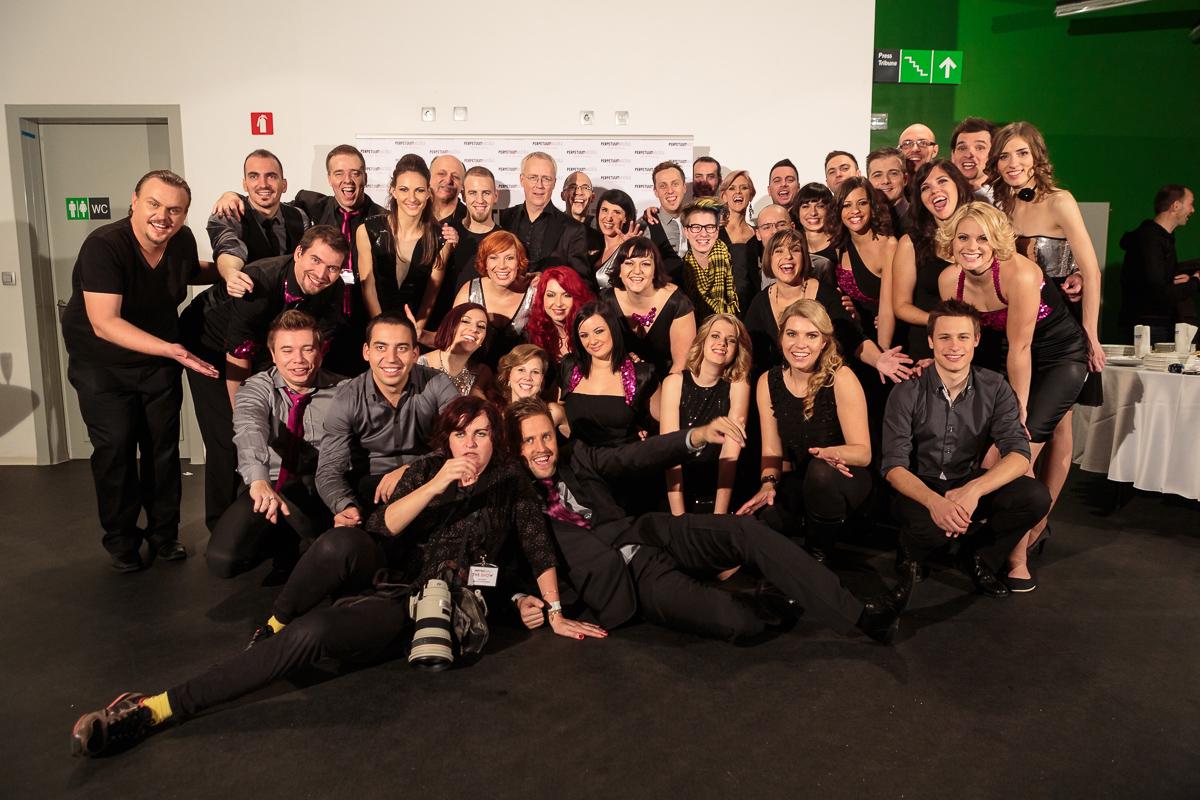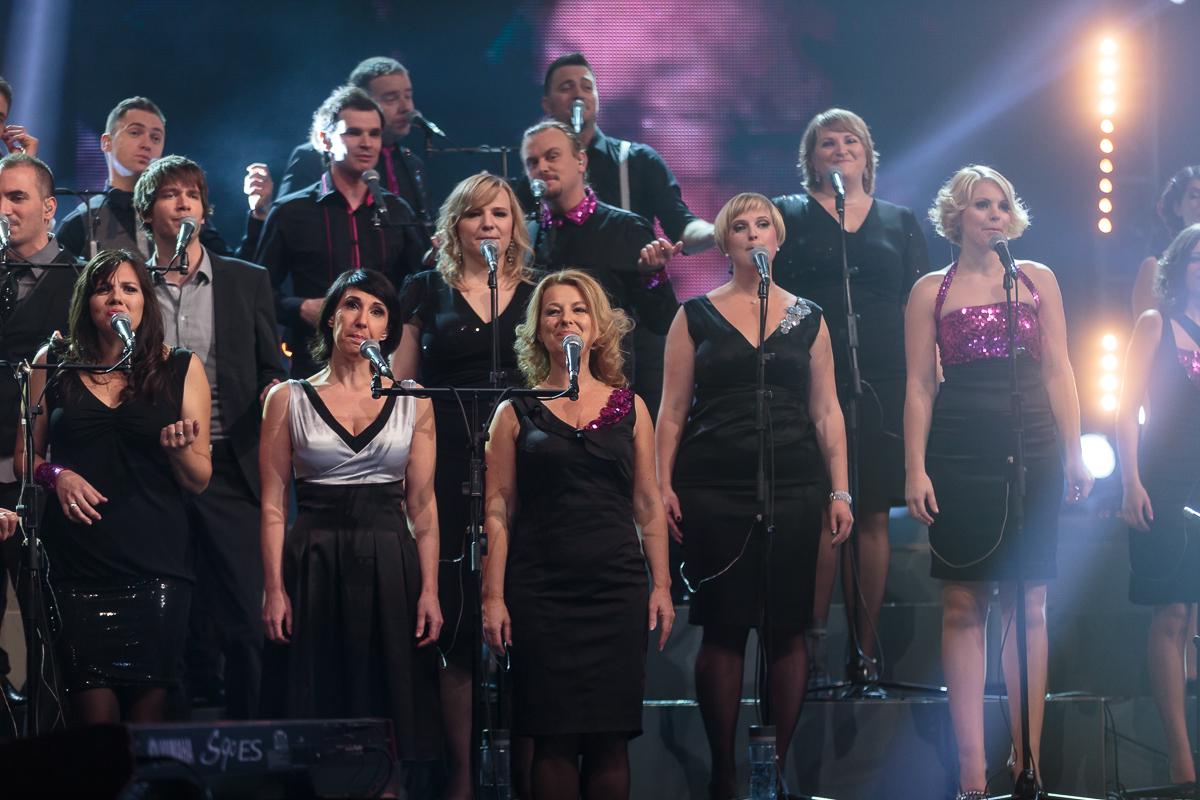


The history of Perpetuum Jazzile (PJ) began in 1983, when the choirmaster Marko Tiran formed the Gaudeamus choir, which brought together singers performing popular and jazz music. In 1999, the choir changed its name to Perpetuum Jazzile, and in 2001, Tomaž Kozlevčar became the choirmaster, helping the group to achieve immense success. Since 2011, PJ has been led by Peder Karlsson from Sweden, who is considered one of the leading experts on a cappella groups in popular music. Because PJ needs continuous guidance, and Mr Karlsson visits Ljubljana only once a month, his deputy, Sandra Feketija, an alto and soloist in PJ, has a major role. Sandra Feketija shared her feelings, expectations and love of music with us.
I met Sandra Feketija before the group’s scheduled practice. They were also expecting the choirmaster to visit, so she was already looking forward to his visit and practicing together. The friendly and charismatic singer radiates positive energy, which is also the feeling that is created when the entire ensemble sings.
Thirty years of Perpetuum Jazzile. What are your feelings?
I am as old as our choir, so I celebrated two anniversaries last year. I was very glad that we remembered everyone who has contributed to the PJ story over the years. I felt truly honoured and am very grateful to the former members for being part of this story and particularly for coming to Stožice, so that I could meet them. It is a fact that without them, there would be no us, the current team.
Is the spectacular concert in Stožice one of the greatest highlights of PJ?
I believe it is one of the greatest achievements of the Slovenian music scene, and definitely the greatest achievement of PJ in Slovenia. We had heard that it has been hard to sell out the arena with previous performers, so we expected a similar situation. We were very surprised at the excellent response.
You have been a member of PJ since 2004. What are the differences between the leadership of Tomaž Kozlevčar and the current choirmaster, Peder Karlsson? How did you experience this?
The differences are in their approach to work and the arrangements. I must stress that I have the greatest respect for Mr Kozlevčar and I think that he is an incredibly skilful arranger. I believe that there is no-one like him working on vocal music in Slovenia and beyond, because his ideas are really excellent. Mr Karlsson has brought a breath of fresh air to PJ; just like with his former group, The Real Group, he introduced new methods, and an approach to learning and practicing a cappella music. I like it a lot that everything is based on a positive attitude to work and a cappella music, as it provides great motivation, inspiration and enthusiasm. Mr Karlsson is highly eccentric, positive and good-humoured, so it is really great to create a story with him (she laughs).
First, you were a singer, then a soloist, and now a conductor ….
I never expected that, and never thought things would go this way. When I joined the choir, I saw PJ as a great platform for learning, because there had been many people with great knowledge before me. I was very motivated when I joined, so I just absorbed the knowledge. At the end, it paid off: they invited me to take the position of deputy choirmaster, which was two and a half years ago. I do not see it as a job. When you have been a member of PJ for nine years and all of the singers are your friends, you are together on and off stage…It becomes a way of life.
Mr Karlsson features more soloists. Will he give every member an opportunity? What are his selection methods? Does it depend on the voice, the song?
Absolutely. He is convinced that there are more talents in the group than we have highlighted before. However, it is true that not everyone is right for everything. Some are good soloists for one kind of music, and others for another. Perhaps the right song has not come along for singers who have not been featured yet.
PJ caused great excitement all around the world with their version of ‘Africa’ by Toto. Since the recording was posted on YouTube in May 2009, it has had over 16 million hits.
Everyone in the group agrees that the best things in life come on their own. No-one planned that version with the idea of making a hit, a YouTube sensation. We have always worked according to the principle that if someone has an idea for a song, we provide feedback. For 'Africa'’, Boštjan Usenik, our manager, had the idea, Mr. Kozlevčar loved it and did the arrangement, and we started working on the song. Sašo Vrabič, our vocal percussionist, found a recording of a South-African choir on the internet who used the element of rain and suggested using that. We loved that idea too. Then…I don’t know…our sound technician, Dare Novak, said that everything, the stars and the planets were in the right constellation…We were so surprised to see the number of hits going up, we could not believe it …(laughs).
You have made two successful tours of the USA, the most recent one last year.
The Americans were awaiting us eagerly; we became friends via our Facebook page and also in person. During our performances there, we heard shouts of encouragement and excitement even as we were going on stage. The USA was a great and positive experience.
You spend a lot of time together, you are friends…Are there any couples in PJ?
Oh, yes, and the number is increasing (laughs). I believe that there are eight couples now; there have never been as many. I believe this is due to '’Africa'. The more popular we become, the more time we spend together working, practicing, socialising, and once you spend so much time together, things happen on their own.
Where is PJ heading in terms of selecting songs?
Perhaps we stopped in the 1980s for a while, because we really like this music. But we want to move on; it is good to do a modern or an older song, or a classic, and to expand the range of music genres. While we are pretty diverse in terms of genres, we’ve tended to perform more pop than search for diverse genres. Perhaps we will take this direction, but we have not decided on anything yet.
What are your wishes for the future?
That we do not focus so much on where we can get into a market, but that the music is the most important thing. That is why I joined this group and felt the love and joy of music, and I would really like this to be preserved, regardless of PJ’s popularity. I would not like popularity to make the group more introverted or affect it negatively. I really would not like that to happen. I would like us to remain true to ourselves and pursue only what we like and what we think audiences would like. When we started out, this is how ‘Africa’ happened; this is how our success has always happened. I believe that this is why people like us, for our love of music.
Danila Golob, SINFO

































































